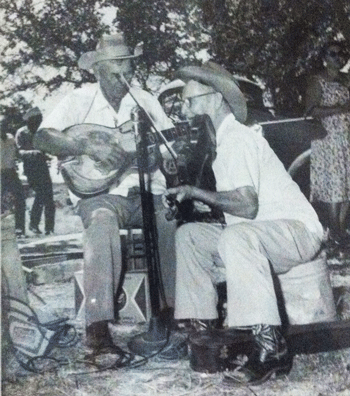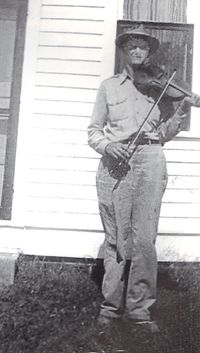Annotation:Black Eyed Susie (1): Difference between revisions
No edit summary |
No edit summary |
||
| Line 10: | Line 10: | ||
<div style="text-align: justify;"> | <div style="text-align: justify;"> | ||
<br> | <br> | ||
'''BLACK EYED SUSIE [1]'''. AKA and see variant "[[Hop Up Kitty Puss (1)]]" (northeast Ky.), "[[Kitty Puss]]," "[[Possum Up a Simmon Tree (1)]]," "[[Puncheon Camp]]," "[[Puncheon Camps]]." | '''BLACK EYED SUSIE [1]'''. AKA and see variant "[[Hop Up Kitty Puss (1)]]" (northeast Ky.), "[[Kitty Puss]]," "[[Possum Up a Simmon Tree (1)]]," "[[Puncheon Camp]]," "[[Puncheon Camps]]." American, Air and Reel. USA; southwestern Virginia, Alabama, Mississippi, Arkansas, Nebraska, Kentucky. D Major (most versions): G Major (Newcomer). Standard or GDad (Newcomer) tunings (fiddle). AB (Christeson, Krassen/1983, Silberberg): AABB (Brody, Krassen /1973): AA'BB' (Phillips). "One of the most popular breakdown tunes," note the New Lost City Ramblers (1964), widespread throughout the South and Southwest in both song and instrumental versions. | ||
<br> | <br> | ||
<br> | <br> | ||
| Line 65: | Line 65: | ||
Document 8040, "The Hill Billies/Al Hopkins and His Buckle Busters: Complete Recorded Works in Chronological Order, vol. 2" (reissue). | Document 8040, "The Hill Billies/Al Hopkins and His Buckle Busters: Complete Recorded Works in Chronological Order, vol. 2" (reissue). | ||
Folkways FA 2492, New Lost City Ramblers – "String Band Instrumentals" (1964. Learned from J.P. Nestor & Whitter's Virginia Breakdowners). | Folkways FA 2492, New Lost City Ramblers – "String Band Instrumentals" (1964. Learned from J.P. Nestor & Whitter's Virginia Breakdowners). | ||
Gennett 6257 (78 RPM), Doc Roberts ( | Gennett 6257 (78 RPM), Doc Roberts & John Booker (1927). | ||
Library of Congress AFS 02634a01, Elmo Newcomer (1939). | Library of Congress AFS 02634a01, Elmo Newcomer (1939). | ||
Marimac 9009, Rafe Stefanini – "Old Time Friends" (1987). | Marimac 9009, Rafe Stefanini – "Old Time Friends" (1987). | ||
Revision as of 03:10, 29 February 2020
X:1 T:Black-Eyed Susie [1] N:From the playing of fiddler Doc Roberts (1897-1978, Madison County, Ky.) M:C| L:1/8 R:Reel D:Gennett 6257a (78 RPM), Doc Roberts (1927) D:https://www.slippery-hill.com/recording/black-eyed-susie-5 Z:Transcribed by Andrew Kuntz K:D P:Intro A part (not repeated): (fg|a2)fg a2f2|g2 ea g2eg|fedf ecec|d2A2F2Ac|| P:B d2d2 fdec|d2d2 B2c2|d2 eg fdec|dBAG F2Ac| d2d2 fdec|d2d2 B2c2|d2d2 fdec|dBAG F2A2|| P:A a3a a2f2|g2b2g2 eg|f2d2 ecec|d2A2F2A2| a3a a2f2|gfga gfeg|fedf ecec|dBAG F2A2||
BLACK EYED SUSIE [1]. AKA and see variant "Hop Up Kitty Puss (1)" (northeast Ky.), "Kitty Puss," "Possum Up a Simmon Tree (1)," "Puncheon Camp," "Puncheon Camps." American, Air and Reel. USA; southwestern Virginia, Alabama, Mississippi, Arkansas, Nebraska, Kentucky. D Major (most versions): G Major (Newcomer). Standard or GDad (Newcomer) tunings (fiddle). AB (Christeson, Krassen/1983, Silberberg): AABB (Brody, Krassen /1973): AA'BB' (Phillips). "One of the most popular breakdown tunes," note the New Lost City Ramblers (1964), widespread throughout the South and Southwest in both song and instrumental versions.
Bayard (1981) traces the history of the tune, beginning in the British Isles with a melody called "Rosasolis," set by Giles Farnaby (c. 1560–c.1600), which appears in the the Fitzwilliam Virginal Book. Another version of the melody is called "Morris Off" and appears in Jehan Tabourot's Orchesographie (1588); it is still used for English morris dances and has been called the earliest recorded morris tune. Still another version appears as an old Welsh harp tune in Alawon Fy Ngwlad/Lays of My Land. Later developments of the tune were popular in England and Scotland from the early 17th century through the 18th, under the title "Three Jolly Sheep Skins (1);" while in Ireland a variation became known as "Aillilliu mo Mhailin" (Alas my little bag) {a humorous lament for a stolen bag of sundries}.

I love my wife, and I love my baby,
And I Love them flapjacks floatin' in gravy.
Sometimes drunk and sometimes woozy,
And sometimes dance with Black-eyed Susie.
All I want to make me happy,
Is two little boys to call me Pappy.
One named Dick and the other named Davy,
Come to your daddy a-holdin' the baby.

